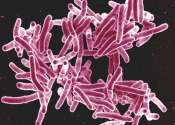The Journal of Experimental Medicine is a peer-reviewed academic journal published by the Rockefeller University Press that publishes research papers and commentaries on the physiological, pathological, and molecular mechanisms that encompass the host response to disease. The journal prioritizes studies on intact organisms and has made a commitment to publishing studies on human subjects. Topics covered include immunology, inflammation, infectious disease, hematopoiesisas, cancer, stem cells and vascular biology. The JEM is second highest (based on impact factor) among the journals that publish basic research articles from all fields of biomedicine. Among all biomedical journals (specialized or nonspecialized) JEM stands among the top 10.
The JEM was founded in 1896 at the Johns Hopkins School of Medicine by William H. Welch, the school’s founder and also the first president of the Board of Scientific Directors of the Rockefeller Institute (since re-named the Rockefeller University). From its inception, Welch edited the journal by himself—even editing manuscripts while attending baseball games—and he eventually found that it placed too heavy a burden on his time. By March 1902, the
- Publisher
- Rockefeller University Press
- Country
- United States
- History
- 1896–present
- Website
- http://www.jem.org/
- Impact factor
-
14.776
(2010)
Some content from Wikipedia,
licensed under CC BY-SA






